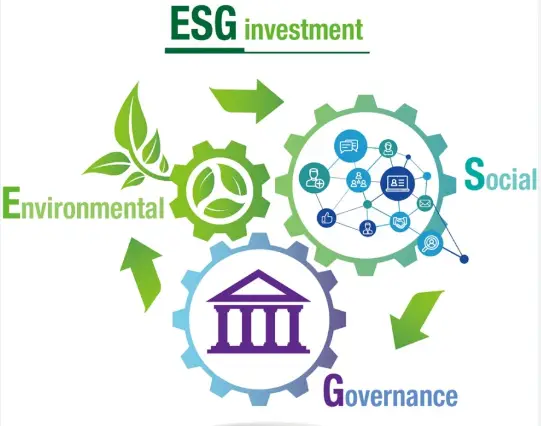In recent years, ESG (Environmental, Social, and Governance) investing has transformed from a niche strategy into a mainstream investment approach embraced by individual and institutional investors alike. As global awareness of social, environmental, and corporate governance issues continues to grow, the demand for responsible investment options has skyrocketed. This article explores the trends driving the rise of ESG investing and offers predictions for its future impact on the investment landscape.

Understanding ESG Investing
ESG investing involves evaluating potential investments based on their performance in three key areas: environmental responsibility, social impact, and governance practices. Investors assess how companies manage risks and opportunities related to these criteria, aiming to support businesses that are not only profitable but also socially and environmentally responsible. ESG factors can include a company’s carbon emissions, labor practices, community engagement, and board diversity.
This shift toward ESG investing is driven by a variety of factors, including changing investor preferences, regulatory pressures, and the increasing recognition that sustainable practices can lead to long-term financial performance.
Key Trends Influencing ESG Investing
1. Growing Investor Awareness and Demand
The rise of social media and information-sharing platforms has amplified awareness of global issues such as climate change, income inequality, and corporate accountability. As a result, investors—especially younger generations—are more inclined to invest in companies that align with their values. Research indicates that millennials and Gen Z investors prioritize sustainability and ethical considerations when making investment decisions. This demographic shift is compelling asset managers and financial institutions to incorporate ESG factors into their offerings.
2. Integration of ESG into Investment Strategies
A growing number of institutional investors are integrating ESG criteria into their investment strategies. Major pension funds, endowments, and sovereign wealth funds are now incorporating ESG considerations into their portfolio management processes. This trend reflects a broader recognition that ESG factors can mitigate risks and enhance long-term performance. According to a 2021 report from BlackRock, nearly 100% of institutional investors surveyed said they consider ESG factors in their investment decisions, emphasizing the importance of sustainable practices in building resilient portfolios.
3. Increased Regulatory Focus
Governments and regulatory bodies are also driving the growth of ESG investing. Initiatives like the European Union’s Sustainable Finance Disclosure Regulation (SFDR) and the U.S. Securities and Exchange Commission’s (SEC) increased focus on climate-related disclosures are prompting companies to adopt more transparent ESG practices. These regulations aim to hold companies accountable for their impact on the environment and society, ultimately encouraging greater investment in sustainable businesses.
4. Rise of ESG Ratings and Standards
The proliferation of ESG ratings and standards has made it easier for investors to evaluate companies based on their ESG performance. Organizations such as MSCI, Sustainalytics, and the Global Reporting Initiative (GRI) provide ratings and assessments that help investors identify and compare ESG-compliant companies. As the demand for standardized ESG data grows, it will become increasingly important for investors to rely on robust metrics to inform their investment choices.
Predictions for the Future of ESG Investing
1. Continued Growth in Sustainable Investment Products
As awareness of ESG investing continues to rise, the demand for sustainable investment products—such as ESG-focused mutual funds and exchange-traded funds (ETFs)—is expected to grow significantly. Analysts predict that the global ESG investment market could reach $50 trillion by 2025, driven by increasing investor interest and the growing availability of sustainable investment options.
2. Enhanced Corporate Transparency and Accountability
Companies will likely face increasing pressure to improve their ESG practices and disclose their performance transparently. Investors will demand more comprehensive reporting on ESG metrics, leading to enhanced corporate accountability. This shift will encourage businesses to adopt sustainable practices and prioritize stakeholder engagement, fostering a culture of responsibility.
3. Focus on Climate Change and Social Justice
Climate change and social justice will continue to dominate the ESG conversation. Investors will increasingly seek opportunities to support companies addressing these critical issues, whether through renewable energy initiatives, sustainable supply chains, or social equity programs. As global challenges persist, the focus on aligning investments with solutions will intensify.
4. Innovation in ESG Technologies
Advances in technology, such as artificial intelligence and big data analytics, will revolutionize the way ESG factors are assessed and integrated into investment strategies. Investors will leverage these tools to gather insights, identify trends, and evaluate potential investments more effectively. The increased availability of real-time ESG data will enhance decision-making and contribute to the overall growth of sustainable investing.
Conclusion
The rise of ESG investing marks a significant shift in the financial landscape, driven by changing investor preferences, regulatory pressures, and the growing recognition of the importance of sustainability. As awareness of environmental and social issues continues to rise, ESG investing is poised for sustained growth in the coming years. By aligning profit with purpose, investors can contribute to a more sustainable future while enjoying the potential for long-term financial rewards. The journey of ESG investing is just beginning, and its future impact on the investment world promises to be profound and transformative.










